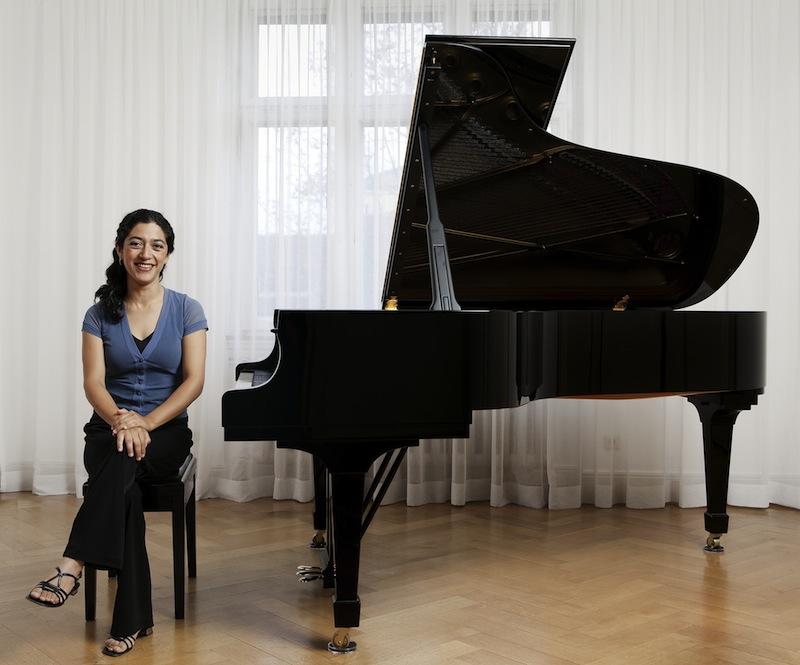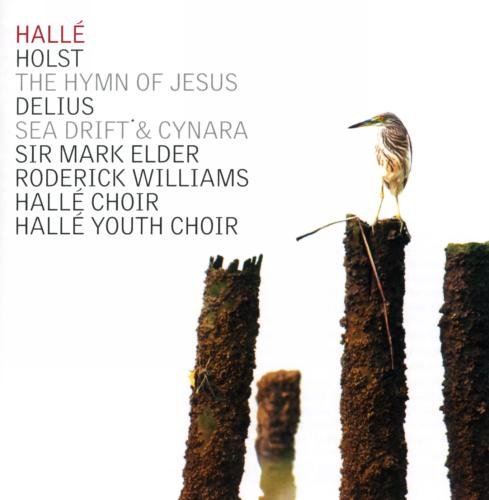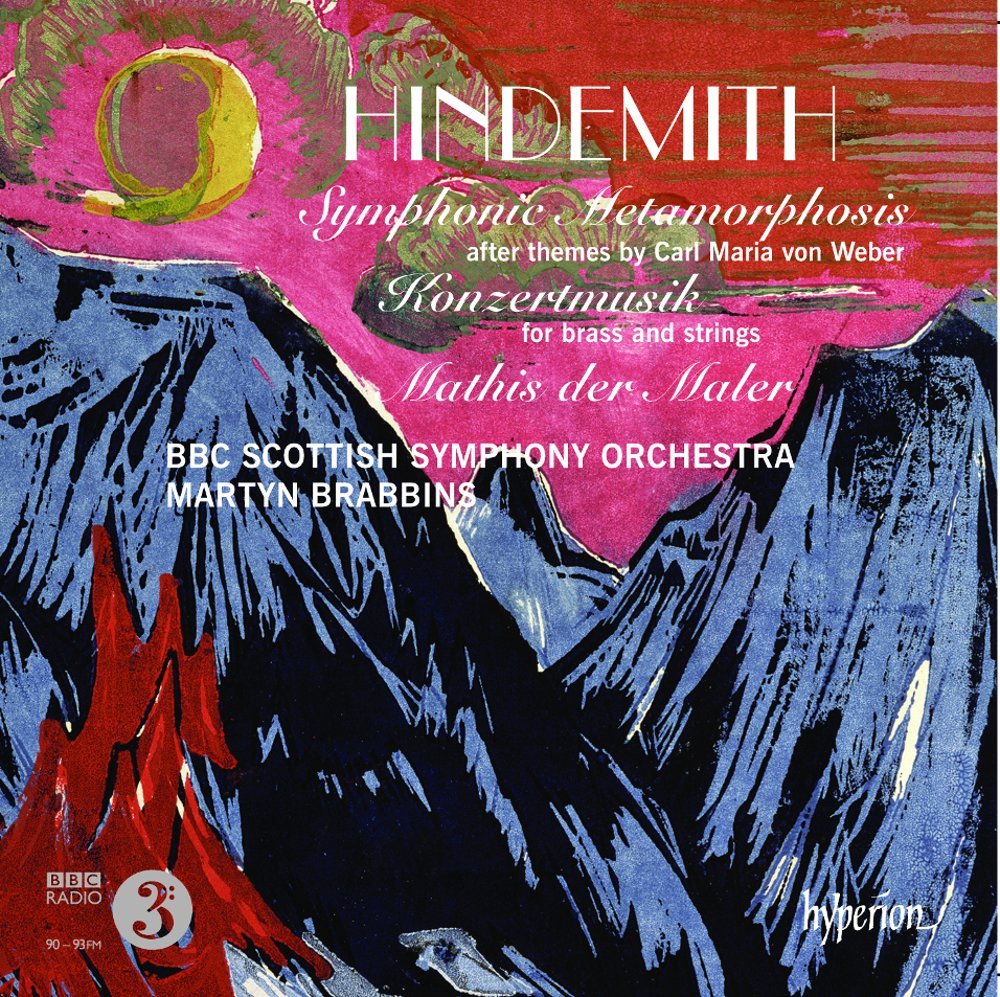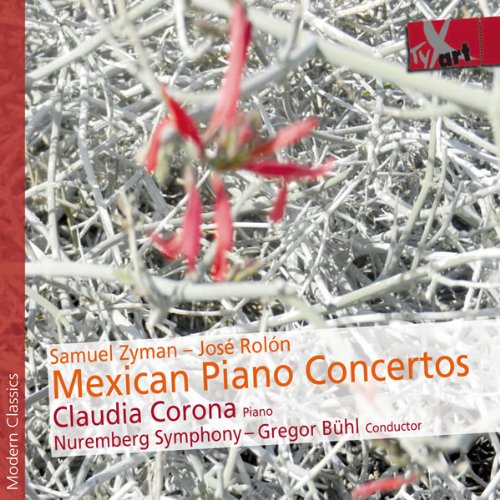Classical CDs Weekly: Delius, Hindemith, Holst, Claudia Corona | reviews, news & interviews
Classical CDs Weekly: Delius, Hindemith, Holst, Claudia Corona
Classical CDs Weekly: Delius, Hindemith, Holst, Claudia Corona
British choral music, 20th century orchestral classics and piano concertos from Mexico


Surprising musical effects are often achieved with relatively simple means. Holst's Hymn of Jesus contains several striking moments. Such as the bold modulation during the full chorus's “Glory to Thee, Father!” at the beginning of the second part. It could suggest a novice composer fiddling aimlessly with a sequence of unrelated major triads, but here it'll have the hairs on the back of your neck standing up. Holst's ecstatic setting of texts from the Apocrypha still sounds bold. This predominantly slow-moving piece rarely feels leaden; the 5/4 rhythms dancing with pleasing grace in this full-throated Manchester live performance. Moments of crowd-pleasing drama are offset by passages of incredible subtlety – sample the distant women's voices near the close of the Prelude answered by a male choir singing a plainchant melody. Structurally the piece is perfect – it lasts little more than 20 minutes, which pass in the blinking of an eye. Elder's reading is ideal in combining flowing speeds with rich weight. This is a work which could make the most dedicated atheist reconsider their position.
If only the couplings were on the same level. Not that these forces don't give their all in Delius's Sea Drift and Cynara, but that these two works can't help sounding a little insipid after the Holst. In Sea Drift, Roderick Williams delivers Walt Whitman's ungainly text with some grace. But not even he and Elder can prevent the work sounding like an extremely turgid and protracted stretch of exquisite, rather static, background music. Cynara's 11 minutes are easier to digest, setting an overheated text by the poet Ernest Dowson. Delius sketched the work in 1907, finally completing it in 1929 with the help of his untested amanuensis Eric Fenby. Fenby's efforts earned him £15 and Delius's approval, paving the way for the composer's final works. The Hallé players produce ravishing, translucent textures, and Elder directs with calm sincerity. 
Hindemith's habit of giving his most colourful works dry, academic-sounding titles means that these three highly accessible pieces are perceived as off-limits by many listeners. Well, it's their loss. The Konzertmusik for brass and strings is fabulous – neatly constructed and beautifully written, as you'd expect from a composer who could play every orchestral instrument with some competence. Wise listeners will be drawn to experience its pleasures again and again, marvelling at the clever details, like the strings' opening chorale reprised on massed horns at the close of the first part, or the jaunty tuba line accompanying the second movement's subsidiary theme. The rush of adrenalin in the closing minutes is so uplifting, so positive. If you love brass and, er, you love strings, you'll love this. Martyn Brabbins's hardworking BBC Scottish players cope brilliantly with Hindemith's demands, also turning in a neat, poised reading of the three-movement symphony the composer drew from the opera Mathis der Maler. Hindemith's busy counterpoint seldom sounds dry, and Brabbins glories in the little moments of rapture – the first movement's sonorous coda, and the ecstatic brass Alleluias which close the piece.
There's also the crowd-pleasing Symphonic Metamorphosis, gleefully transmuting Weber's small-scale piano duet themes into a unexpectedly entertaining showpiece. Bernstein's Israel Philharmonic recording remains the brassiest and punchiest, but Brabbins's performance has loads to commend it – fabulous percussion in the Turandot scherzo, and an elegant solo flute in the Andantino. A wonderful disc, and the perfect introduction to a still under-appreciated composer.
José Rolón Alcarez played a key role as director of the Conservatorio Nacional de Música in Mexico City in the late 1930s. A cosmopolitan, European-trained composer, he sought to blend contemporary European techniques with Mexican folk idioms. So you'd be forgiven for half-expecting the results to sound a little naff. But Rolón was adamant that folk music shouldn't be treated trivially, as a superficial harmonic and rhythmic gloss. His thoughts were in opposition to those of the Mexican government, who would have preferred the nation's classical music to simply reflect indigenous traditions, helping to reinforce a sense of national cultural identity. Two works by Rolón are included on this engaging anthology. The neo-classical Piano Concerto was completed in 1935, and it's a substantial, serious work. The folk influences bubble away. But, as with Bartók's mature music, they never feel intrusive. The opening minutes are incredibly engaging, Rolón managing cheeky allusions to Gershwin, Prokofiev and Stravinsky while an incisive guiro scrapes away. There's a lot going on, but Rolón keeps the textures sharp and clear. The only drawback is the music's relative lack of light and shade – all is bright, breezy and propulsive, even the slow movement. But you'd travel a long way to hear this piece live, and Mexican pianist Claudia Corona's rhythmic zest is infectious. She's given punchy backing by Gregor Bühl's Nuremberg Symphony. They also give us Rolón's earlier orchestral scherzo El Festin de los Enanos, an enjoyable romp betraying the composer's French influences.
The disc opens with a much more recent Piano Concerto by Samuel Zyman, born in 1956 and educated at the Juilliard School in the 1980s. It's another enjoyable, hyperactive work – more acerbic but highly accessible. Zyman's chamber scoring is always lucid, the structures always easy to follow. Again, Corona plays brilliantly, and the recording quality is warm, rich and detailed. An enjoyable, offbeat release.
Explore topics
Share this article
The future of Arts Journalism
You can stop theartsdesk.com closing!
We urgently need financing to survive. Our fundraising drive has thus far raised £49,000 but we need to reach £100,000 or we will be forced to close. Please contribute here: https://gofund.me/c3f6033d
And if you can forward this information to anyone who might assist, we’d be grateful.

Subscribe to theartsdesk.com
Thank you for continuing to read our work on theartsdesk.com. For unlimited access to every article in its entirety, including our archive of more than 15,000 pieces, we're asking for £5 per month or £40 per year. We feel it's a very good deal, and hope you do too.
To take a subscription now simply click here.
And if you're looking for that extra gift for a friend or family member, why not treat them to a theartsdesk.com gift subscription?
more Classical music
 Kempf, Brno Philharmonic, Davies, Bridgewater Hall, Manchester review - European tradition meets American jazz
Bouncing Czechs enjoy their Gershwin and Brubeck alongside Janáček and Dvořák
Kempf, Brno Philharmonic, Davies, Bridgewater Hall, Manchester review - European tradition meets American jazz
Bouncing Czechs enjoy their Gershwin and Brubeck alongside Janáček and Dvořák
 Solomon, OAE, Butt, QEH review - daft Biblical whitewashing with great choruses
Even a top soprano and mezzo can’t make this Handel paean wholly convincing
Solomon, OAE, Butt, QEH review - daft Biblical whitewashing with great choruses
Even a top soprano and mezzo can’t make this Handel paean wholly convincing
 Two-Piano Gala, Kings Place review - shining constellations
London Piano Festival curators and illustrious friends entertain and enlighten
Two-Piano Gala, Kings Place review - shining constellations
London Piano Festival curators and illustrious friends entertain and enlighten
 Echo Vocal Ensemble, Latto, Union Chapel review - eclectic choral programme garlanded with dance
Beautiful singing at the heart of an imaginative and stylistically varied concert
Echo Vocal Ensemble, Latto, Union Chapel review - eclectic choral programme garlanded with dance
Beautiful singing at the heart of an imaginative and stylistically varied concert
 Scott, Irish Baroque Orchestra, Whelan, RIAM, Dublin review - towards a Mozart masterpiece
Characteristic joy and enlightenment from this team, but a valveless horn brings problems
Scott, Irish Baroque Orchestra, Whelan, RIAM, Dublin review - towards a Mozart masterpiece
Characteristic joy and enlightenment from this team, but a valveless horn brings problems
 Classical CDs: Voice flutes, flugelhorns and froth
Baroque sonatas, English orchestral music and an emotionally-charged vocal recital
Classical CDs: Voice flutes, flugelhorns and froth
Baroque sonatas, English orchestral music and an emotionally-charged vocal recital
 Kanneh-Mason, Britten Sinfonia, Shave, Milton Court - a grin and a big beaming smile
A pair of striking contemporary pieces alongside two old favourites
Kanneh-Mason, Britten Sinfonia, Shave, Milton Court - a grin and a big beaming smile
A pair of striking contemporary pieces alongside two old favourites
 theartsdesk at the New Ross Piano Festival - Finghin Collins’ musical rainbow
From revelatory Bach played with astounding maturity by a 22 year old to four-hand jazz
theartsdesk at the New Ross Piano Festival - Finghin Collins’ musical rainbow
From revelatory Bach played with astounding maturity by a 22 year old to four-hand jazz
 First Person: Manchester Camerata's Head of Artistic Planning Clara Marshall Cawley on questioning the status quo
Five days of free events with all sorts of audiences around Manchester starts tomorrow
First Person: Manchester Camerata's Head of Artistic Planning Clara Marshall Cawley on questioning the status quo
Five days of free events with all sorts of audiences around Manchester starts tomorrow
 Goldscheider, Brother Tree Sound, Kings Place review - music of hope from a young composer
Unusual combination of horn, strings and electronics makes for some intriguing listening
Goldscheider, Brother Tree Sound, Kings Place review - music of hope from a young composer
Unusual combination of horn, strings and electronics makes for some intriguing listening

Add comment